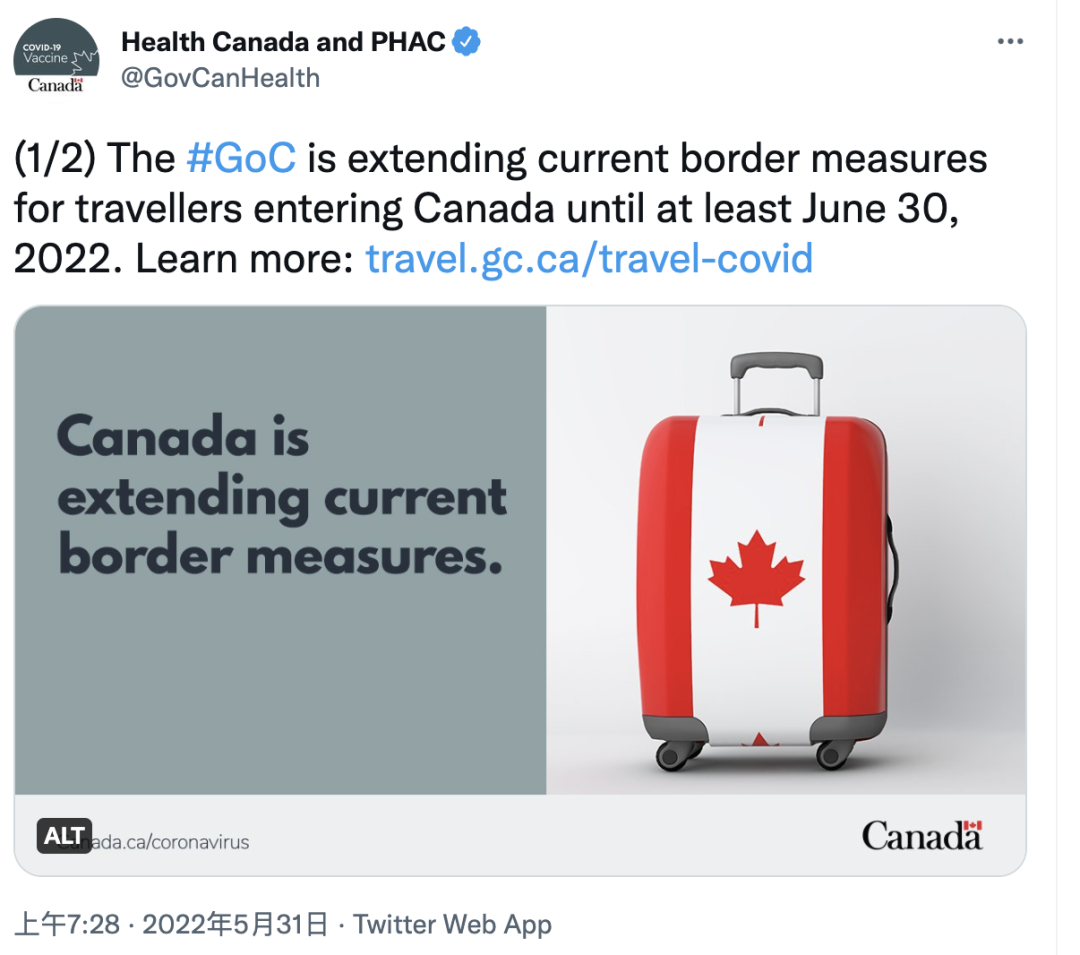On May 31, local time, Canada released the latest border policy.
Health Canada and Public Health have announced that the entry policy for fully vaccinated people will be maintained until June 30, and fully vaccinated foreign tourists will continue to need to provide proof of full vaccination when entering Canada.

Let's take a look at what needs to be paid attention to in the entry!
First, whether to be fully vaccinated
1. Definition of full vaccination eligibility:
- Have received at least 2 doses of Canadian-approved COVID-19 vaccine, either a mix of 2 acceptable vaccines or at least 1 dose of Janssen/Johnson & Johnson vaccine;
- Have received a second dose of the vaccine for more than 14 days before entering Canada; for example: if your second dose was given at any time on 1 July, then 15 July will be the first day you meet the 14-day condition, and this time applies only to the second dose, not the third or fourth dose;
- No signs or symptoms of infection with the new crown;
- Obtain an ArriveCAN receipt by uploading a vaccination certificate in ArriveCAN with the letters A, I, or V next to your name.
2. List of vaccines recognized in Canada:
Currently, there are nine vaccines recognized in Canada. These include the common AstraZeneca, Johnson & Johnson, Modena, Pfizer vaccines, as well as Sinopharm and Kexing vaccines commonly administered in China.
3. Vaccination certificate:
Vaccination certificates need to be in English or French, and if they are in other languages, they need to be translated and certified, and please bring the original vaccination certificate and certified translation with you when you travel.
4. Incomplete vaccination
If you do not receive two or more doses of the required vaccine, or if you are not able to provide proof of full vaccination, you will be considered incompletely vaccinated.
Non-fully vaccinated persons are required to enter Canada under the following conditions:
(1) Confirm whether you can enter Canada by filling out "Find out if you can enter Canada".
The link is as follows:
https://travel.gc.ca/travel-covid/travel-restrictions/wizard-start
(2) Citizens or permanent residents who have not been fully vaccinated
Unvaccinated Canadian citizens or permanent residents are required to show a nucleic acid negative certificate taken before entering Canada and quarantine for 14 days. If the entry point is Calgary, Montreal, Toronto or Vancouver, you need to make an appointment in advance for a nucleic acid test after arriving at the local airport.
(3) Children who have not been fully vaccinated
Unvaccinated and partially vaccinated children under 12 years of age who are travelling with a fully vaccinated adult do not need to provide a valid pre-entry test result. Children under 5 years of age, regardless of their vaccination status, do not need to be tested.
2. The list that needs to be prepared before entering the country
To enter or return to Canada as a fully vaccinated traveler, you must comply with these requirements, whether you are driving or flying, please carry the following items with you for assessment by border government officials (WiFi is not available at land border crossings):
- ArriveCAN code with the letters A, I, or V next to the name of the passenger who received the vaccination
- Vaccination certificate uploaded to ArriveCAN (original or paper copy)
- Nucleic acid supporting documents (if any)
- Travel documents with consistent information entered in ArriveCAN (e.g. passports)
3. Submit relevant information and documents through ArriveCAN before entering the country
All travelers to Canada, regardless of their nationality, must submit their health information, such as vaccination certificates, via the ArriveCAN app within 72 hours of entry.
Note that inbound travelers who do not fill in their personal information through ArriveCAN may face severe penalties of 14 days of quarantine, arrival nucleic acid testing and 8 days of nucleic acid testing, and a fine of $5,000 CAD.
For more details on entry, please refer to the official website:
https://travel.gc.ca/travel-covid/travel-restrictions/covid-vaccinated-travellers-entering-canada